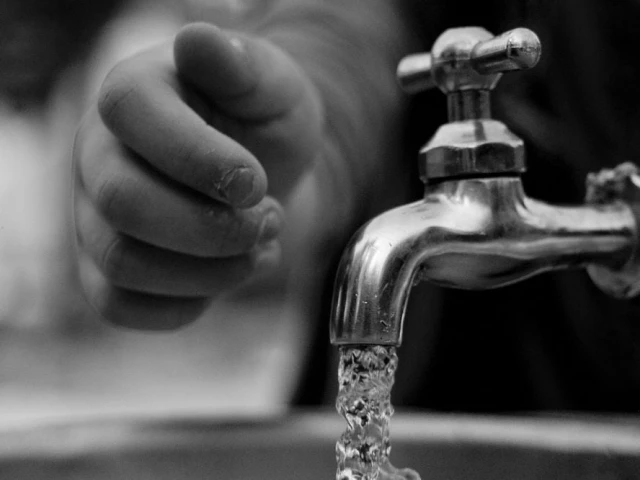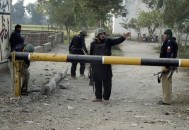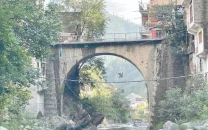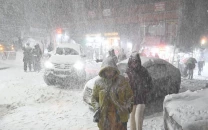Pindi's water demand outpaces supply
Experts stress long-term strategies like conservation, regulation of tanker mafia and public awareness

With an expansion in population, groundwater depletion and migration of people to the garrison city, Rawalpindi faces water availability challenges and urgently requires a multi-faceted approach.
These approaches include expanding water storage capacity through dams and reservoirs, improving water distribution networks, promoting water conservation measures, and addressing issues like tanker mafia and infrastructure maintenance.
Recognising these challenges, the city's civic agencies have been taking measures for the construction of new dams like Chahan and Daducha dams, and side by side steps for maintaining the storage capacity of existing Rawal and Khanpur dams.
Managing Director (MD) of Water and Sanitation Agency (WASA) Muhammad Saleem Ashraf says the Garrison City needs a total water supply of around 51 Million Gallons Daily (MGD) in winter, 30.5 MGD of which is through 480 tube-wells, 10 MGD from the Rawal Dam and 6 MGD from the Khanpur Dam.
The city has to face a shortfall of around 7 MGD in winter, which rises to around 19 MGD during summer, with the daily water demand reaching over 70 MGD, he added.
Both the cantonments (Rawalpindi and Chaklala) also receive some 12 MGD water from the Rawal Dam, the WASA MD said. For overcoming the water shortage, Saleem says work is already underway on the Developing Resilient Environment and Advancing Municipal Services (DREAMS-I) project, funded by the Asian Development Bank (ADB).
The project's overall scope involved the treatment and transportation of 14.5 MGD water from Chahan Dam to Rawalpindi city, besides the improvement and replacement of the city's existing water supply system, he added.
Moreover, he said, the rehabilitation and upgradation of Rawal Lake filtration plants were also in process to supply an additional 5 MGD of water to the Garrison City. Similarly, he said, two new heavy pumps are being installed at the Khanpur Dam to increase water supply to 8 MGD. The project to provide a 24/7 water supply to three union councils of Khayaban-e-Sir Syed was also underway."
This project (DREAMS) of public importance will be completed in two years instead of the stipulated period of three years," he added. The MD further said that work on the Chahan Dam treatment plant had been kicked off, which was expected to provide 10 MGD of water to Rawalpindi city.
He said the feasibility of setting up the Daducha Dam had been included in the Punjab Annual Development Plan, which would hopefully provide 30.5 MGD water to meet the future needs of the city.
As regards water losses, he said that water leakage and theft from the distribution network were major sources of water loss and needed to be addressed. He said the Punjab Government had banned the establishment of new car washing stations across the province. In compliance with the orders of the Lahore High Court (LHC), the Punjab Environmental Agency (EPA) had imposed a ban on non-essential use of underground water and violators, including car wash/service stations, would have to face heavy fines, he warned.
Chief Executive Officer of the Rawalpindi Cantonment Board (RCB) Syed Ali Rizvi says the RCB provides some 1.50 MGD water to its residents from 55 tube wells, 11.28 MGD from the Khanpur Dam and 0.03 MGD from the Rawal Dam. The RCB's distribution network includes eight overhead reservoirs and 34 underground tanks, he says and adds the Board provides clean drinking water to the people through 52 filtration plants.
MNA Malik Ibrar Ahmed says the construction of modern underground tanks having a capacity to store 1 MGD water has entered the final stage.
The project aims to provide a lasting solution to the longstanding water shortage in local communities of RCB areas, ensuring improved supply and overcoming the seasonal scarcity, especially during the summer months.
He says every year, with the onset of summer, the residents of Rawalpindi and Chaklala cantonments face severe water shortages due to the lack of storage facilities, but allocated funds are now being prioritised for the timely completion of the vital projects.
The construction of underground tanks at Bhata Chowk, with a storage capacity of 200,000 gallons per day, and Gawalmandi, with a capacity of 100,000 gallons per day, are rapidly progressing, the MNA adds. Additionally, he adds, projects are underway at Naseerabad, Barf Khana Chowk, Ghazi Abad, Afshan Colony, Tench Bhatta, Tahli Mohri, and Wards 7, 8, 9 and 10 of the Chaklala Cantonment, each designed to store 50,000 gallons daily.
























COMMENTS (2)
Comments are moderated and generally will be posted if they are on-topic and not abusive.
For more information, please see our Comments FAQ